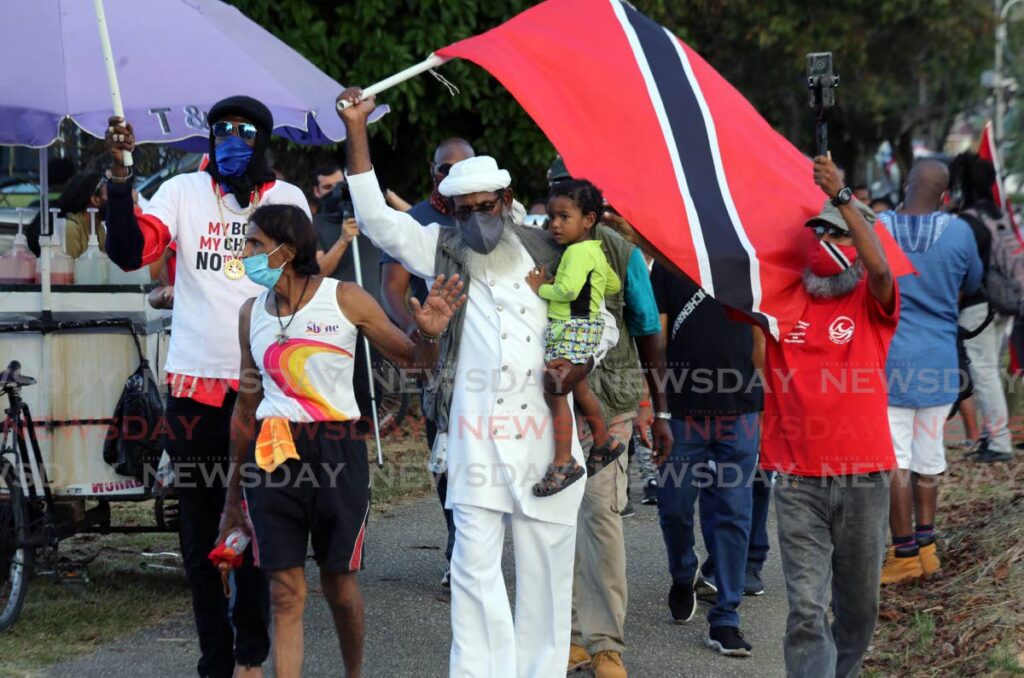Second First Wave march sedate, incident-free

Saturday’s march around the Queen’s Park Savannah, held by The First Wave Movement was sedate, especially when compared to a similar march last Sunday.
The last march, organised by leader of The First Wave Movement, Umar Abdullah, was not authorised by the police, had over 300 participants, and ended in a confrontation between police and protesters which led to police using tear gas on the crowd and some people being detained.
On the other hand, Saturday’s march was authorised, had around 100 people, who were mostly socially distanced and relatively quiet.
The march was part of the World Wide Rally For Freedom in which people in 40 countries and 150 cities called for the end of covid19 restrictions. The international rally called for a stand for the freedom of speech, movement, choice, assembly and health.
Abdullah said it was not an anti-vaccination march but a call for the government to address the concerns of the population.
“We are here to show the government that we are dissatisfied. We don’t want you out of power but we want you to listen to the people. We want you to understand what we are saying.”
The march was to address issues with education and health systems, economical and financial difficulties caused by lockdowns and safe zones, family members being at odds because of differences of opinion with regard to the vaccines, no investigations into deaths in hospitals, and, of course, “mandatory” vaccination.
“Why are you not applying early treatment methods? Why are you telling people to go home and when they get more sick to come back to the hospital? Why are you doing this? A lot of questions need to be answered.”
One woman wore a cardboard sandwich board reading “Resistance to tyrants is obedience to God” while some wore t-shirts that read, “My body, my choice. No to mandatory vaccination.”
Protesters occasionally sang songs, such as How Great Though Art, and shouted “freedom” or “we fed up of oppression” but were generally quiet or spoke amongst themselves throughout the march.
During the three hours, they were flanked by five police vehicles as they walked around the savannah.
The permission given to Abdullah stipulated the march would be between 2 pm and 5 pm, up to 250 people in groups of ten, that they would practise social distancing and sanitisation, and there would be no gathering after the march.
Before the start of the march, acting ACP Walker spoke to Abdullah and advised him if anyone was disorderly, the police would take “effective action” to ensure people remained safe. He said he did not want any confrontations but the police wanted to ensure it continued in a peaceful manner in which people could express their views.
“It’s a step in the right direction,” said Abdullah. “We see this as a sign that democracy is still at work in our country and we want to say thank you publicly to the acting commissioner of police. We hope that this relationship will continue into the future. We hope to have some dialogue with him very soon.
“We just want to express to the police service that we are here for you as well. You all have the same concerns as us. Your family is ending up in the same health institutions as our families are ending up. They are dying just as our families are dying. They are getting sick just as our families. So we are standing for you. You can’t come and do this what we are doing so we are here for you.”
One protester, Damian Bujan, said he participated because he believed anything that goes into his body should be his choice.
“The medicine is not as tested as it should be and they are now trying to put it on my children. That’s why I am here today, to protect my children and myself from being forced to do something we don’t want to do.”
He said he hoped that, in the near future, “someone at the top” realised people were opposing mandatory vaccination and change their tactics.
UWI lecturer Dr Charles de Matas said he attended to show his solidarity with people around the world fighting for their freedom.
“Their freedoms are being taken away by these mandates and lockdowns and coercion is being used to vaccinate people. I think we are losing our democratic rights and basic freedoms. We need to resist that, we need to come out, protest if necessary and try to reverse these trends.”
In a statement on Saturday, acting CoP McDonald Jacob thanked the organisers of march for their cooperation as well as the police who were on duty to supervise the event. He estimated about 90 participants who made three laps around the savannah "in a peaceful and organised manner."


Comments
"Second First Wave march sedate, incident-free"